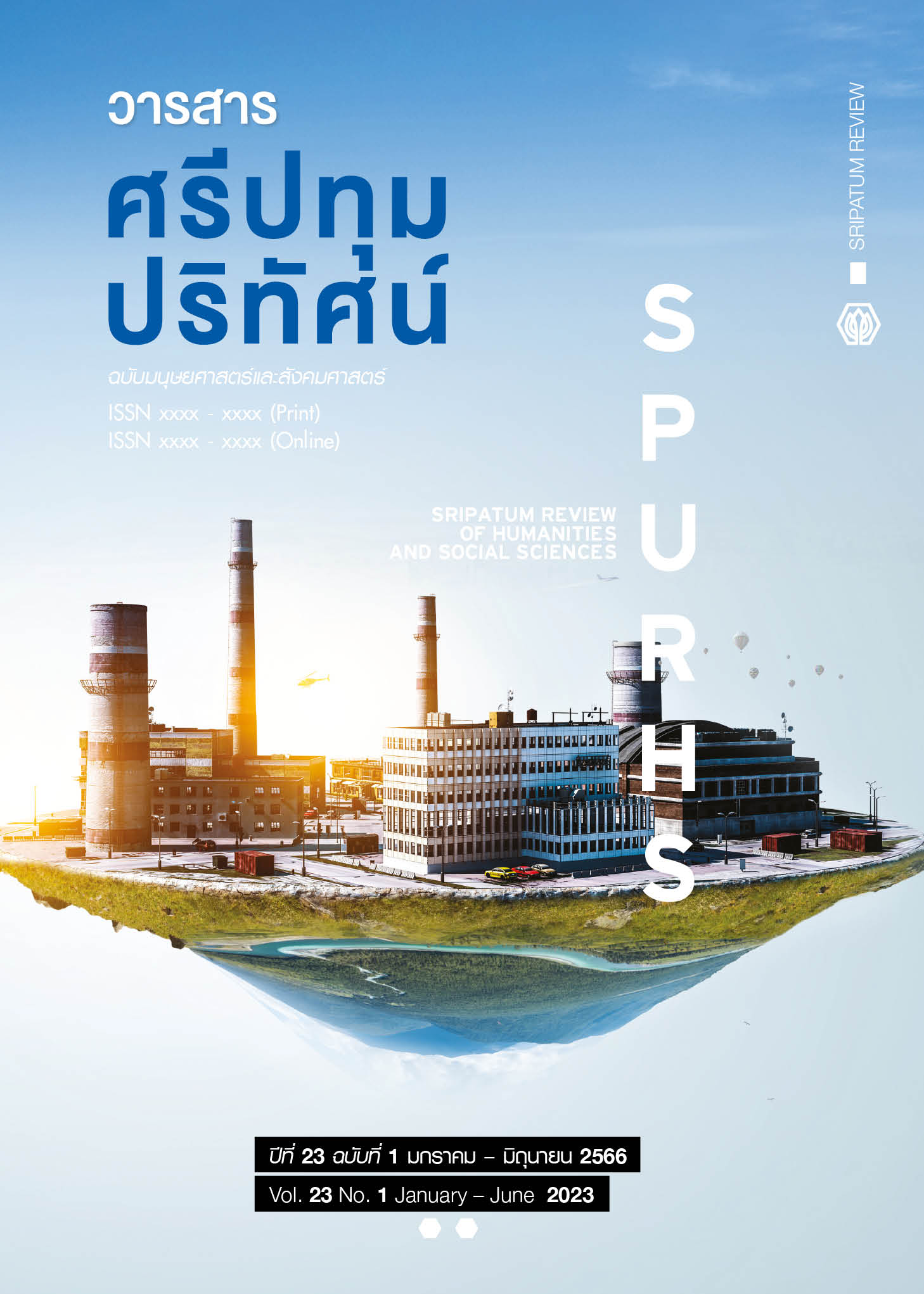The Effect of Changes in Service Employee Characteristics on Customer Satisfaction According to COVID-19 in Bangkok, Thailand
Main Article Content
Abstract
The purpose of this study was to investigate the effect of changes in service employee characteristics on customer satisfaction in the hospitality and tourism-related sectors according to COVID-19 in Bangkok, Thailand. Previously, it was found that four dimensions of service employee characteristics: personal presentation, product knowledge, service mind, and willingness to help had an impact on customer satisfaction. However, the outcomes had been changed due to the use of PPE during the COVID-19 era. This research applied a qualitative approach. Semi-structured interviews were conducted with three experts in the hospitality and tourism-related field and five customers via Skype, Zoom, and Facetime from July 3rd, 2020, to July 31st, 2020. A convenience sampling technique was used to select samples for data collection. Direct content analysis was utilized for analyzing data. The results showed that since the pandemic, customers are more concerned about their well-being and safety, while service staff had to follow COVID-19 rules and regulations at all costs, thus the perceptions of customers had changed. Service businesses should train their staff to ensure that they have adequate product knowledge and a service-oriented attitude when providing services to maintain customer satisfaction. Moreover, technology-savvy skills, healthcare handling skills, communication skills, and adaptation to changes were needed for service businesses to further proceed in the post-pandemic.
Article Details

This work is licensed under a Creative Commons Attribution-NonCommercial-NoDerivatives 4.0 International License.
1. กองบรรณาธิการสงวนสิทธิ์ในการพิจารณาและตัดสินการตีพิมพ์บทความในวารสาร
2. บทความทุกเรื่องจะได้รับการตรวจสอบทางวิชาการโดยผู้ทรงคุณวุฒิ แต่ข้อความและเนื้อหาในบทความที่ตีพิมพ์เป็นความรับผิดชอบของผู้เขียนแต่เพียงผู้เดียว มิใช่ความคิดเห็นและความรับผิดชอบของมหาวิทยาลัยศรีปทุม
3. การคัดลอกอ้างอิงต้องดำเนินการตามการปฏิบัติในหมู่นักวิชาการโดยทั่วไป และสอดคล้องกับกฎหมายที่เกี่ยวข้อง
References
Ahmadi, A. (2019). Thai Airways: Key influencing factors on customers’ word of mouth. International Journal of Quality and Reliability Management, 36(1), 40–57.
Alexander, C. (2020). Thailand announces end to COVID-19 lockdown. [Online]. Retrieved June 1, 2020, from: http://www.panorama-destination.com/thailand-news/thailand-announces-end-to-covid-19-lockdown.
Alhelalat, J. A., Habiballah, M. A., and Twaissi, N. M. (2017). The impact of personal and functional aspects of restaurant employee service behaviour on customer satisfaction. International Journal of Hospitality Management, 66, 46–53.
Boon-itt, S., and Rompho, N. (2012). Measuring service quality dimensions: An empirical analysis of Thai hotel industry. International Journal of Business Administration, 3(5), 52–63.
Bowen, D. (2009). Why service recovery fails: Tensions among customer, employee and process perspectives. Journal of Service Management, 20(3), 253–273.
Chieochankitkan, A., and Sukpatch, K. (2014). The customers’ perception of service quality for spa establishments in the active beach tourism cluster, Thailand. Silpakorn University Journal of Social Sciences, Humanities and Arts, 14(3), 53–75.
Darian, J. C., Wiman, A. R., and Tucci, L. A. (2005). Retail patronage intentions: The relative importance of perceived prices and salesperson service attributes. Journal of Retailing and Consumer Services, 12(1), 15–23.
Galletta, A. (2013). Mastering the semi-structured interview and beyond. New York: New York University Press.
Hennink, M. M., Kaiser, B. N., and Marconi, V. C. (2016). Code saturation versus meaning saturation: How many interviews are enough? Qualitative Health Research, 27(4), 591-608.
Hopkins, C. D., Mitra, K., and Engelland, B. T. (2015). Effects of salesperson attractiveness on consumer perceptions of service quality: A conceptual framework. The Proceedings of the 1998 Academy of Marketing Science (AMS) Annual Conference, 442–447.
Idrus, S. A., Abdussakir, A., Djakfar, M., and Idrus, S. A. (2021). The effect of product knowledge and service quality on customer satisfaction. Journal of Asian Finance, Economics and Business, 8(1), 927-938.
Kim, Y.-J., and Kim, H.-S. (2022). The impact of hotel customer experience on customer satisfaction through online reviews. Sustainability, 14(2), 1-13.
Krippendorff, K. (2018). Content analysis: An introduction to its methodology. 4th ed. Philadelphia: Sage Publications.
Lau, T., Cheung, M. L., Pires, G. D., and Chan, C. (2019). Customer satisfaction with sommelier services of upscale Chinese restaurants in Hong Kong. International Journal of Wine Business Research, 13(4), 532-554.
Liang, L., and Wu, G. (2022). Effects of COVID-19 on customer service experience: Can employees wearing facemasks enhance customer-perceived service quality? Journal of Hospitality and Tourism Management, 50, 10-20.
Ngaochay, T. (2015). Human resource development activities in a retail franchise in Thailand: The case of Coffee World. Journal of Economics and Behavioral Studies, 7(1), 72–78.
Ong, A. K.S., Prasetyo, Y. T., Mariñas, K. A., Perez, J. P.A., Persada, S. F., Nadlifatin, R., Chuenyindee, T., and Buaphiban, T. (2022). Factors affecting customer satisfaction in fast food restaurant “Jollibee” during the COVID-19 pandemic. Sustainability, 14(22), 1-19.
Rajatanavin, N., Tuangratananon, T., Suphanchaimat, R., and Tangcharoensathien, V. (2021). Responding to the COVID-19 second wave in Thailand by diversifying and adapting lessons from the first wave. BMJ Global Health, 1-9.
Techakitteranun, H. (2020). Coronavirus: Thailand begins easing lockdown measures. [Online]. Retrieved May 29, 2020, from: https://www.straitstimes.com/asia/se-asia/coronavirus-thailand-begins-easing-lockdown-measures.
Van Scheers, L. (2015). The importance that customers place on service attributes of sale personnel in the retail sector. Foundations of Management, 7(1), 191–198.
Wang, M. L. (2012). How does the learning climate affect customer satisfaction? Service Industries Journal, 32(8), 1283–1303.
Wang, Y.-C., and Lang, C. (2019). Service employee dress: Effects on employee-customer interactions and customer-brand relationship at full-service restaurants. Journal of Retailing and Consumer Services, 50, 1-9.
Zeithaml, V. A., Parasuraman, A., and Berry, L. L. (1990). Delivering quality service: Balancing customer perceptions and expectations. New York: The Free Press.
Zena, P. A., and Hadisumarto, A. D. (2013). The study of relationship among experiential marketing, service quality, customer satisfaction, and customer loyalty. ASEAN Marketing Journal, 4(1), 37–46.


